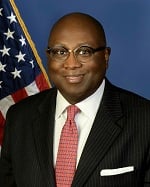 Image: Shutterstock.
Image: Shutterstock.
Last year, an FDIC report detailed how tens of millions of Americans lack access to safe, reliable financial services like checking and savings accounts. These "unbanked" and "underbanked" Americans often live on the precarious edge of financial emergency; an unexpected job loss, auto repair or health emergency can be catastrophic.
To make ends meet, many turn to storefront payday lenders, check cashers or other alternative providers. But these aren't realistic long-term solutions, and too often lock borrowers into a punishing cycle of debt.
The question is, how can the financial services industry reach these underserved consumers? The NCUA, the independent federal financial regulator I oversee, is making it a priority to find creative ways to help people avoid that debt cycle.
We took a significant step in the right direction at our most recent board meeting by approving the Payday Alternative Loans II rules, which give federal credit unions more flexibility to extend small-dollar loans to their members. These new rules will allow federal credit unions to better help low- and moderate-income borrowers get out of debt and enter the financial mainstream.
PALS II updates a 2010 rule that allowed federal credit unions to expand their menu of small-dollar lending options. The new rule improves upon what came before by removing the minimum loan amount, increasing the maximum loan amount to $2,000, and waiving the requirement that new credit union members must wait 30 days before receiving a loan. These changes should help borrowers get access to the kind of affordable small loans they need on a more timely basis.
In crafting this rule, we received substantial input from stakeholders, including credit union industry leaders and consumer advocacy organizations, through the public comment process. This invaluable feedback helped us to address potential areas of concern and ensure the rule strikes the appropriate balance of offering credit unions flexibility in lending while including key safeguards to protect consumers. These critical consumer safeguards include no rollovers, a limit on the number of loans in a given period of time and a prohibition on overdraft fees.
The PALS II rule was developed as a free-market solution that responds to the need for small-dollar lending in the marketplace. Many consumer advocates are rightly critical of storefront lending providers, which they see as exploitative and predatory. I share that concern. But we have to recognize that such lenders are, in fact, offering a service that many consumers seek out in a time of need. In response, we should look for ways to offer superior competing products that also meet consumers' needs through established financial institutions.
Small-dollar loans are a form of higher-risk lending, so they typically carry a higher annual percentage rate. However, PALS II loans have lower rates than comparable storefront alternative lending products, which can be exploitative.
PALS II lending can make a difference by helping borrowers to build or repair a credit record that will allow them to graduate to other mainstream financial products. We want to encourage responsible lending that allows consumers to address their immediate needs while working toward fuller financial inclusion. Particularly when coupled with financial counseling, as many credit unions are already providing to members, such lending can be a powerful tool to help people get out of debt and climb the ladder toward financial security.
The PALS II rule does not require that credit unions offer these small-dollar loans. In fact, many credit unions already have small dollar lending programs in place to address the needs of low- and moderate-income borrowers, and I applaud them for that. But for those who are seeking new solutions to offer affordable credit services to their members, the PALS II rule provides another option. Credit unions should tailor their product mix to meet the needs of their members.
I often emphasize that the credit union industry was established on the principle of people helping people. The PALS II rule reflects that key relationship principle by giving credit unions additional flexibility in providing affordable financial services to underserved communities.
Reducing the numbers of unbanked and underbanked Americas will require fresh thinking. We anticipate that this rule will offer a better way forward and help to protect these vulnerable consumers from pernicious forms of lending that lock them into punishing debt spirals. That will be a critical step forward in welcoming these Americans into the mainstream financial system.
 Rodney E. Hood, chairman of the National Credit Union Administration.
Rodney E. Hood, chairman of the National Credit Union Administration.by Steven Halperson / Tisara Photo
Rodney E. Hood is Chairman of the NCUA.
© Touchpoint Markets, All Rights Reserved. Request academic re-use from www.copyright.com. All other uses, submit a request to [email protected]. For more inforrmation visit Asset & Logo Licensing.






